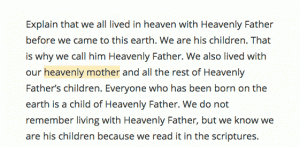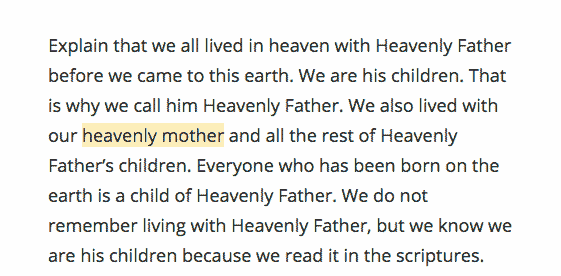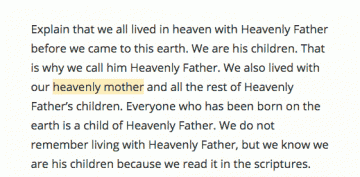Many women—and men—yearn for our heavenly mother.
I don’t. When I believe in her at all, I tend to resent my absentee heavenly parent, just as an abandoned child would resent an earthly parent that doesn’t communicate with her child.
President Dieter F. Uchtdorf has taught that “We improve our relationship with our Heavenly Father by learning of Him, by communing with Him.” Reference A
If this is how strong relationships with deity are formed, it is obvious why I don’t have a healthy relationship with my heavenly mother, if she exists. I don’t learn about her in my Sunday meetings and communing with her through prayer is expressly forbidden.
Most church curricula describe our heavenly family as a single-parent family with a loving Heavenly Father. When heavenly mother is mentioned, she is often mentioned as something of an afterthought, with her name in lowercase letters as if to punctuate how unimportant it is to know her:

The scriptures teach that faith is a spiritual gift and “all have not every gift given unto them.” (D&C 46; Corinthians 12) I do not feel that I have been blessed with the gift of faith. On the contrary, developing faith is hard work for me. It takes study, prayer, and nourishment from my religious community to teach me how to recognize God’s hand in my life. Developing faith in a God I worship regularly and pray to daily, whose attributes I have learned about since childhood, has been hard enough; developing faith in an absentee heavenly parent is a task that doesn’t interest me.
While I may not be naturally faithful, I do have the gift of hope. And so I hope that our heavenly mother is there. I hope that it is only because we view the eternities through patriarchal lenses that we cannot see her and not because she is as aloof and uninterested in us as our church teachings and practices would suggest.






13 Responses
I can relate to this, April. I was so shamed when I told an Institute teacher when I was about 19 that I prayer to her sometimes that I feared praying to Her ever again. I think what softened the blow was that in follow up, (because I suspect he was inspired to know I felt shamed and spiritually depleted) , he explained that when we pray at all– we are praying to both God the Mother and God the Father. That softened it, but yet…. I still feel disassociated from Her.
The striking difference in capitalization between Heavenly Father and heavenly mother in the primary manual is shocking. It reflects institutionalized derogation of Her, and in my mind, of women as a whole as lesser beings.
How can the church not see how horribly it treats women?
This is so important, April. How do any of us develop faith in Her when we don’t really ever hear of Her? I’ve had experiences with something that I can only term Heavenly Mother or Divine Feminine, so I do have faith She exists. But your point is well stated and well-taken. Thanks for sharing your experiences. (And a hearty “Amen” to the capitalization horrors. )
It occurred to me while reading this that if Heavenly Father is a polygamist, as supposedly many will be in the celestial kingdom, then maybe there is more than one heavenly mother. Perhaps it’s just too confusing to differentiate between them all–thus the lower case letters in the title, etc.
I have heard that idea before. It is not comforting. It makes me want to believe in her/them even less.
I agree.
“It makes me want to believe in her/them even less.”
I can well understand why you say that but isn’t it just another case of blaming another female for the actions and consequences of the patriarchs?
That’s the very worst part of a gender-biased society if you ask me: blaming the victims for the faults of the perpetrators.
I’m with you, April. A male God with more than one wife simply makes heaven sound like hell to me.
Statistics do no support celestial polygamy. At least in our day, 51.2 percent of all babies born are male. Over the centuries, a hefty portion of children died before age 8, which, according to LDS theology, places them automatically in the celestial kingdom. And male babies are more likely to die early than females. So even if more females accept the gospel in this life or in the spirit world, the discrepancy is probably more than compensated for by the preponderance of males who are automatically exalted. This, of course, is based on a doctrine that has some scriptural problems, but if we believe it, then celestial polygamy (or polygyny, if you want to get technical) is highly unlikely. FWIW.
FWIW, this is based on only one small amount of history for one planet, which could be an extreme outlier. There could be plenty of planets with a matriarchal society, where births are 60% female. I think the more common planet would be completely egalitarian, with rates waving close to 50%. But again, with no real data, it’s just speculation.
I do so love and adore these posts. Such good inspirations.
Isn’t it curious that in the primary manual “Heavenly Father” is capitalized, while “heavenly mother” is not?
“Heavenly Father” is capitalized because it is a known, proper name. Since we don’t know what the divine feminine’s proper name is, she’s referred to in the manual with a common noun: “our heavenly mother.” It’s the same as when we refer to our earthly parents: if you’re using the word “mom” as your mother’s name you capitalize it (“Can I go, Mom?”), otherwise it’s lower-case (“I’ll ask my mom”).
Thank you for your authentic voice. I love to hear faith affirming stories about Heavnely Mother, but I don’t want it to be like church where we are only allowed to share faith-affirming thoughts. I am grateful for your perspective.